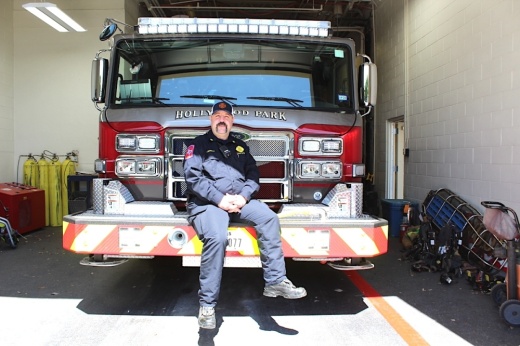Morgan graduated from Texas A&M University-San Antonio with a degree in fire and emergency services administration. He also teaches emergency services courses at San Antonio College.
This interview has been edited for clarity and length.
How are things going in your first few months as fire chief?
It's been a lot of fun. There are lots of opportunities to improve. There’s a great group of folks in the fire department—a nice community with lots of good support. I see there are things that can help them better deliver service for residents and visitors.
What or who inspired you to become a firefighter?
I'm actually a third-generation firefighter. My great-grandfather and grandfather were firefighters. When I was in college, I had a bunch of buddies that joined the fire service, and I had always been on the periphery. I've got pictures when I was little at my granddad's firehouse, and I thought, ‘This is a really cool job.'”
What prompted you to come to Hollywood Park?
One of my best friends used to be here. He called me, said, "Hey, they're looking for somebody, I think you'd be a good fit," and so we had a conversation about it. I had retired from the fire service, and I was working in the corporate world.
What I found out was that I was still kind of in the fire department, but I wasn't in the fire department, sure. Every time I would visit a fire station, they’d say, "You're one of us, but you're not really one of us.”
I found out I missed being in the fire department. I missed being in the fire service. I figured this was a way where I could help mentor, teach, lead, give back to the fire service and prepare the next generation to take over.
What opportunities are there to further strengthen the HPFD?
In the long run, we’re looking to step up our first response services. Right now, we're at the basic life-support level. We're going to look to join the office of the medical director, which is through the University Health System.
That will allow us to act as paramedics and be able to provide a sort of doctor-level care in the field. In that eight- to 10-minute gap of an emergency, instead of waiting for an ambulance to arrive, we’ve already started the care for the patient.
Getting our guys up with training and certification is a big goal. Upgrading and modernizing all of our bunker gear, our small equipment, replacing the fire engine in the next few years—that’s all on the horizon.
Any new initiatives or changes in engaging the community?
One of the programs that we're going to implement is called home safety inspection. We come in and look at the trip and fall hazards in the home. Are there any cooking safety or carbon monoxide hazards? How old are the smoke detectors? A lot of people will just change the battery, but I’d ask how old is the detector?
We’ll be doing that in concert with the program called File of Life. We're going to give residents a document. If you fall and, for some reason, you're unconscious or unable to answer us, we can go get that document, and it tells us everything we need to know about you. It'll also allow us to set up a program where we have access issues getting into your house.





